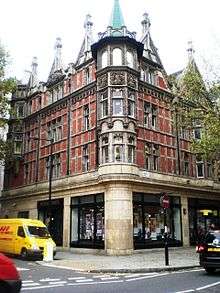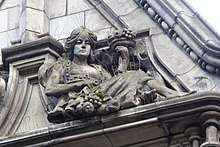Dillons Booksellers
Dillons was a British bookshop founded in 1932, named after its founder and owner Una Dillon. Originally based on Gower Street in London, the bookshop expanded under subsequent owners Pentos plc in the 1980s into a bookselling chain across the United Kingdom. In 1995 Pentos went into receivership and sold Dillons to Thorn EMI, which immediately closed 40 of the 140 Dillons bookstore locations. Of the remaining 100 stores, most kept the name Dillons, while the remainder were Hatchards and Hodges Figgis.[1][2] Within Thorn EMI, Dillons was placed in the HMV Group, which had been a division of Thorn EMI since 1986. EMI demerged from Thorn in August of 1996, and Dillons-HMV remained an EMI holding.[3] Dillons was subsumed under rival chain Waterstones' branding in 1999, at which point the brand ceased to exist.

History
Una Dillon founded the bookshop in 1932, but bought out a failing bookseller on Gower Street (near University College London) in 1936, and moved into the building most associated with the brand. Dillon drove the business forward, including delivering books by bike within eight hours. Her customers and friends included C. Day Lewis, John Betjeman and other bibliophiles.[4]

Dillon subsequently sold the majority of the company to the University of London in 1956, with the proviso that it used her name. Dillon's share was created by her donation of stock and goodwill from her old business. The university invested £11,000 which had been given by an insurance company. A man had died during building work and because he had no relatives, the university redirected the payout. The business was soon worth £1 million a year, and expanded to nearby buildings. Una Dillon retired as managing director from the business in 1968, but remained as a board member until 1977.[5]. Her place, as Managing Director was taken by Peter Stockham. then followed a period when Dillons was controlled by the unions (Actss). Then in 1977, Grant Paton, from Glasgow, was appointed Managing Director by the then owners, University of London. It was taken over shortly afterwards by Pentos Ltd.
Back in private hands by the mid-1980s, the store undertook a major makeover and modernisation, announcing its relaunch with the advertising poster "Foyled again? Try Dillons" displayed prominently on the bus shelter opposite its London rival Foyles.[6]
Inspired by the success of Waterstones, demonstrating the potential for large modern bookshops with a depth of stock, the new owners Pentos plc rapidly rolled out the format across the country, ultimately building up a chain of 75 stores. However, having overreached itself financially,[7] Dillons was acquired by Thorn EMI, which already held the HMV chain, for £36 million.
HMV acquired the larger Waterstones chain in 1998, and the following year the Dillons brand ceased to exist as a separate entity when the branches were rebranded as Waterstones. A remainder were sold on to the smaller chain Ottakar's, which itself was later taken over by Waterstones in 2006.
See also
References
- Stevenson, Tom (20 March 1995). "'Second time lucky' hope of Rymans' buyer". Independent. London. Retrieved 8 March 2020.
- Shepherd, John (25 March 1995). "Thorn EMI closes 40 Dillons bookstores". Independent. London. Retrieved 8 March 2020.
- "Thorn EMI Demerger Proceeding Smoothly". Billboard. 31 August 1996. p. 1, 137.
- Cook, Jean H. (2009) [2004]. "Dillon, Agnes Joseph Madeline [Una] (1903–1993)". Oxford Dictionary of National Biography (online ed.). Oxford University Press. (Subscription or UK public library membership required.)
- "Obituary: Una Dillon". The Independent. 17 April 1993. Retrieved 11 April 2017.
- Christina Foyle; Managed Noted London Bookshop, Los Angeles Times, 11 June 1999.
- "Pentos dealing halted". The Independent. 28 February 1995. Retrieved 3 May 2017.
- Maher, Terry (1994). Against My Better Judgement: Adventures in the City and in the Book Trade. London: Sinclair Stevenson. ISBN 1-85619-518-X.